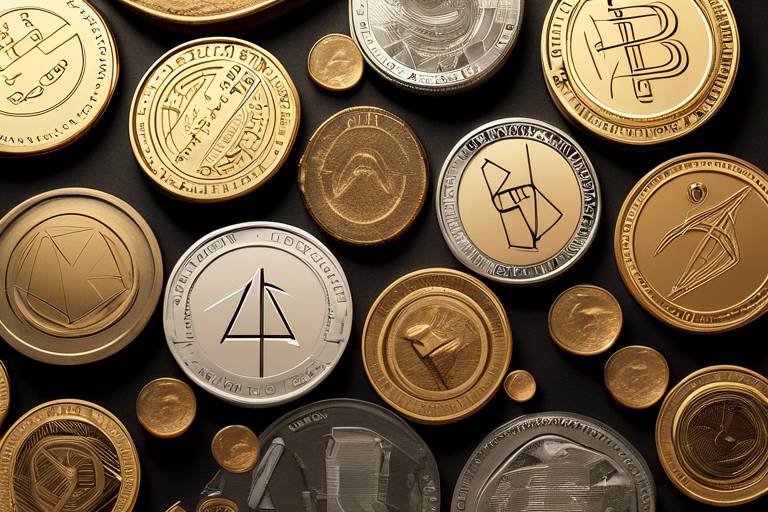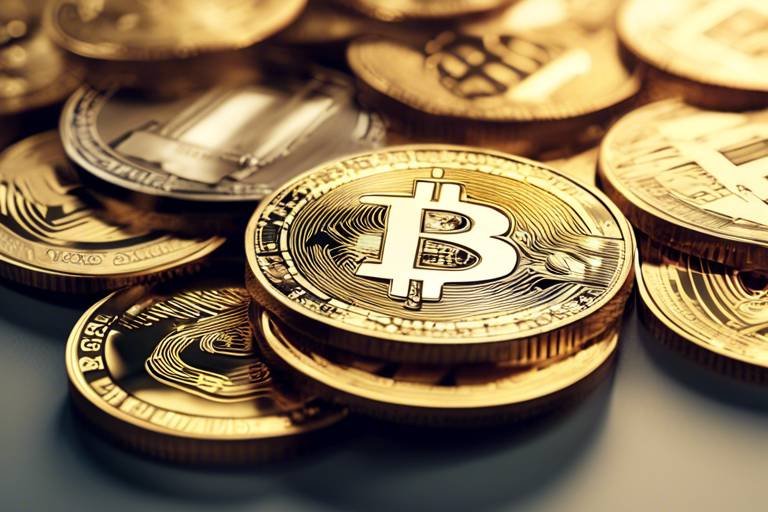Exploring Decentralized Finance - Risks and Rewards
Welcome to the fascinating world of Decentralized Finance (DeFi), where traditional financial systems are being turned on their heads! Imagine a world where you can lend, borrow, and trade without the need for banks or intermediaries. Sounds like a dream, right? Well, it’s becoming a reality thanks to the power of blockchain technology. In this article, we’ll dive deep into the risks and rewards of DeFi, exploring how it’s reshaping our financial landscape and what it means for you as an investor or user.
DeFi has exploded in popularity over the last few years, driven by a desire for more transparent and accessible financial services. The allure of being your own bank, controlling your own assets, and participating in a global financial ecosystem is incredibly enticing. But wait! Before you jump in with both feet, it’s essential to understand the potential pitfalls that come with this new technology.
As we navigate through this article, we’ll take a closer look at how DeFi works, the role of smart contracts, the risks involved, and the exciting future that lies ahead. So, whether you’re a seasoned investor or just curious about what DeFi has to offer, there’s something here for everyone. Let’s get started!
Decentralized finance has emerged as a revolutionary alternative to traditional finance, leveraging blockchain technology to create open financial systems. This section explores its rapid growth and the driving forces behind its popularity. The rise of DeFi can be attributed to several factors:
- Accessibility: Anyone with an internet connection can participate.
- Transparency: All transactions are recorded on the blockchain, making them publicly verifiable.
- Innovation: New financial products are continuously being developed.
The sheer volume of capital flowing into DeFi projects is staggering, with billions of dollars locked in various protocols. This growth reflects a significant shift in how people view finance, moving away from traditional institutions towards a more decentralized model.
At the heart of DeFi are smart contracts, which are self-executing contracts with the terms of the agreement directly written into code. These contracts allow for trustless transactions, meaning you don’t need to rely on a third party to ensure that the terms are met. This is a game-changer for financial transactions, creating efficiency and reducing costs.
Smart contracts offer numerous benefits, including:
- Increased Efficiency: Transactions can be executed automatically without human intervention.
- Reduced Costs: By eliminating intermediaries, users can save on fees.
- Enhanced Security: The blockchain's immutable nature protects against fraud.
These advantages contribute significantly to the appeal of DeFi, allowing users to engage in financial activities with greater confidence and lower barriers to entry.
While smart contracts enhance security, they are not immune to vulnerabilities. Bugs in the code can lead to exploits, resulting in significant financial losses. This is why thorough audits are crucial before deploying any smart contract. Investors must be vigilant and conduct their research to ensure they’re participating in secure platforms.
Smart contracts facilitate various DeFi applications, from lending platforms to decentralized exchanges. Some prominent use cases include:
- Lending and Borrowing: Users can lend their assets to earn interest or borrow against their holdings.
- Decentralized Exchanges (DEXs): Trade cryptocurrencies directly without a centralized authority.
- Yield Farming: Users can earn rewards by providing liquidity to DeFi protocols.
Each of these applications showcases the versatility and potential of DeFi to disrupt traditional financial services.
Despite its advantages, DeFi comes with significant risks. Users must be aware of:
- Smart Contract Vulnerabilities: Bugs can lead to exploits.
- Market Volatility: Cryptocurrency prices can fluctuate wildly.
- Lack of Regulation: This can lead to fraudulent projects.
Understanding these risks is vital for anyone looking to navigate the DeFi landscape successfully.
Governance tokens empower users to participate in decision-making within DeFi protocols. These tokens allow holders to vote on important issues, such as protocol upgrades or changes to fee structures. This democratic approach promotes community involvement and helps shape the future of decentralized finance.
Token holders often receive various incentives, including voting rights and rewards for participation. This encourages active engagement and ensures that the community has a say in the direction of the project.
While governance tokens promote decentralization, they also face challenges such as voter apathy and concentration of power among a few large holders. Addressing these issues is crucial for the long-term success of DeFi governance models.
The future of DeFi holds immense promise, with ongoing innovations and collaborations. As technology evolves, we can expect to see:
- Interoperability: Different DeFi platforms working seamlessly together.
- Regulatory Clarity: Governments providing guidelines for DeFi operations.
- Increased Adoption: More users embracing DeFi as a viable alternative to traditional finance.
These developments could shape the next phase of decentralized finance, making it even more accessible and secure for everyone.
Q: What is DeFi?
A: DeFi stands for Decentralized Finance, a movement that uses blockchain technology to recreate traditional financial systems in a decentralized manner.
Q: How do smart contracts work?
A: Smart contracts are self-executing contracts with the terms written in code, allowing for trustless and automated transactions.
Q: What are the risks of investing in DeFi?
A: Risks include smart contract vulnerabilities, market volatility, and lack of regulation.
Q: How can I participate in DeFi?
A: You can participate by using DeFi platforms for lending, borrowing, trading, and more, but always do your research first!

The Rise of Decentralized Finance
Decentralized finance, or DeFi, has taken the financial world by storm, emerging as a revolutionary alternative to traditional finance. Imagine a world where you can lend, borrow, trade, and earn interest on your assets without the need for banks or financial institutions. This is the essence of DeFi, and its rapid growth is fueled by the increasing adoption of blockchain technology. In just a few short years, the DeFi ecosystem has exploded, with billions of dollars locked in various protocols and platforms. But what exactly is driving this meteoric rise?
One of the primary factors contributing to the popularity of DeFi is the promise of financial inclusivity. Traditional finance has long been criticized for its barriers to entry, often leaving out individuals in underserved communities who lack access to banking services. DeFi aims to change that by providing an open financial system accessible to anyone with an internet connection. This democratization of finance is akin to opening the floodgates, allowing a diverse range of participants to engage in economic activities previously reserved for the privileged few.
Moreover, the allure of higher returns is another significant draw. In DeFi, users can earn interest rates that far exceed those offered by traditional savings accounts. For instance, lending platforms often provide interest rates of 5% to 20% or more, depending on the asset and market conditions. This has led many to consider DeFi as a viable alternative for their savings, akin to finding a hidden treasure chest in a sea of dull financial options.
As the DeFi landscape continues to evolve, several key elements are shaping its growth:
- Innovative Products: From yield farming to liquidity mining, DeFi has introduced a plethora of financial products that cater to various investor appetites. These innovations are not just buzzwords; they represent real opportunities for earning and investment.
- Community-Driven Development: The DeFi space thrives on community involvement. Many projects are open-source, encouraging developers and users to contribute to their evolution. This collaborative spirit fosters innovation and rapid advancement.
- Interoperability: DeFi platforms are increasingly designed to work together, allowing users to move assets seamlessly across different protocols. This interconnectedness enhances user experience and expands the possibilities for financial activities.
However, while the rise of DeFi is exciting, it also comes with its fair share of challenges. Users must navigate a landscape filled with complex technologies, and the lack of regulation can lead to risks that are often overlooked. As the saying goes, "with great power comes great responsibility." The key for potential investors and users is to educate themselves thoroughly about the risks and rewards before diving into this new financial frontier.
In conclusion, the rise of decentralized finance is more than just a trend; it represents a significant shift in how we think about and engage with financial systems. With its promise of inclusivity, higher returns, and innovative products, DeFi is poised to reshape the financial landscape for years to come. As we continue to explore the depths of this exciting domain, one thing is clear: the journey has only just begun.
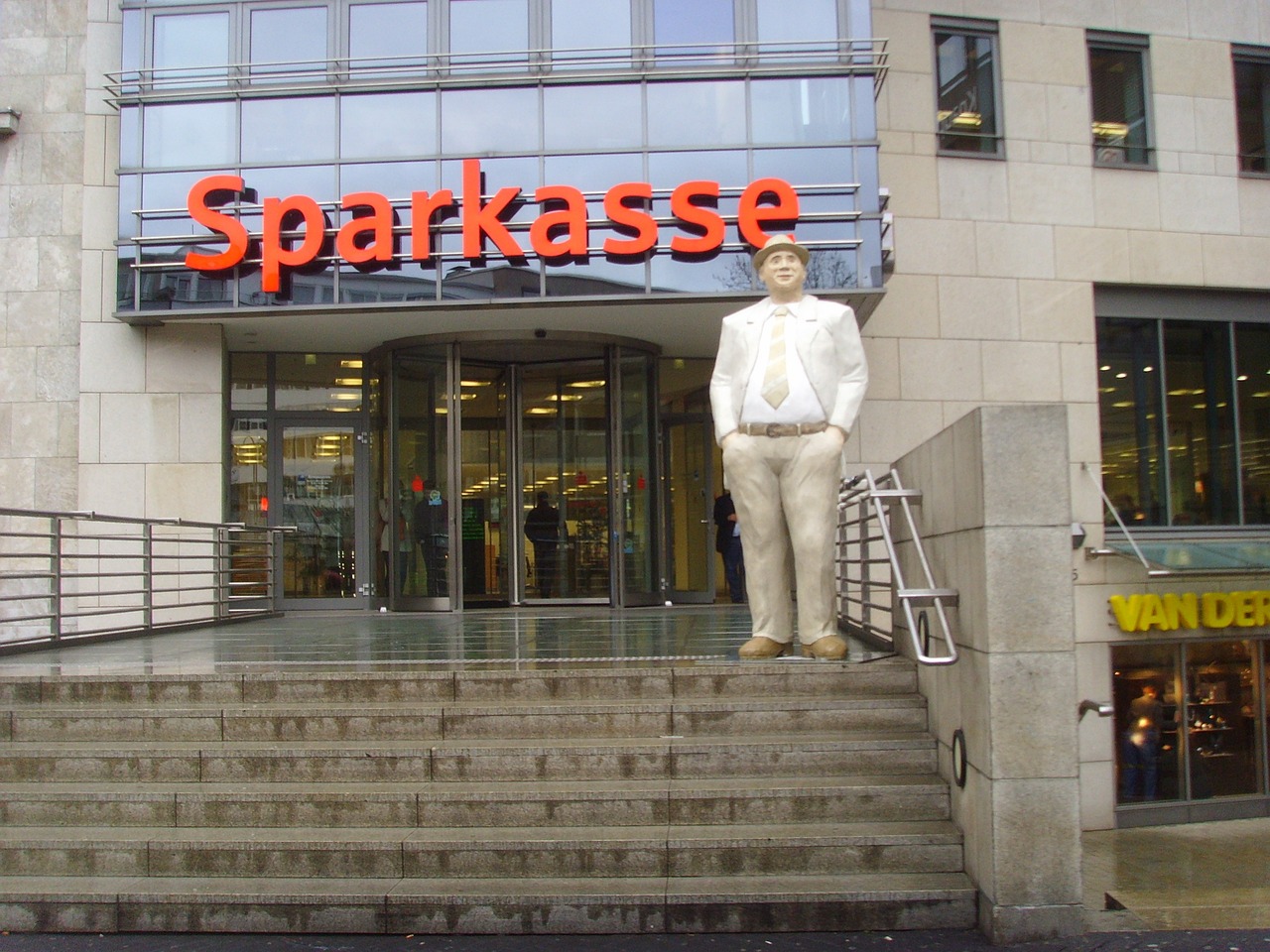
Understanding Smart Contracts
When we talk about decentralized finance, we can't overlook the role of smart contracts. These digital agreements are like the backbone of DeFi, enabling transactions that are not only automated but also trustless. Imagine a vending machine: you insert your coins, select your snack, and voilà! The machine dispenses your treat without needing a cashier. This is essentially how smart contracts operate in the world of finance. They execute automatically when predefined conditions are met, eliminating the need for intermediaries and minimizing the chances of human error.
But what exactly are smart contracts? In simple terms, they are self-executing contracts with the terms of the agreement directly written into lines of code. They reside on the blockchain, which means they are immutable and transparent. This transparency is crucial because it allows all parties involved to verify the terms and conditions without relying on a third party. The beauty of this technology is that it democratizes access to financial services, making them available to anyone with an internet connection.
Now, let's break down how these smart contracts function. They operate on a set of rules that are programmed into the contract itself. For instance, consider a lending platform where Alice wants to lend money to Bob. The smart contract would stipulate the amount, interest rate, and repayment schedule. Once Bob accepts these terms, the contract automatically manages the transaction, releasing funds to Bob and ensuring repayments are made on time. If Bob fails to repay, the smart contract can automatically enforce penalties, such as charging fees or seizing collateral. This level of automation not only enhances efficiency but also significantly reduces operational costs.
Smart contracts come with a plethora of advantages that make them appealing in the DeFi landscape:
- Increased Efficiency: By automating processes, smart contracts eliminate the need for manual intervention, speeding up transactions.
- Cost Reduction: With fewer intermediaries involved, users can save on transaction fees.
- Enhanced Security: Stored on the blockchain, smart contracts are less susceptible to fraud and hacking.
However, while the benefits are enticing, it’s important to recognize that smart contracts are not without their flaws. Security vulnerabilities can arise from coding errors, which can be exploited by malicious actors. This brings us to the critical need for thorough audits before deploying any smart contract. Just like you wouldn’t want to drive a car without checking the brakes, you don’t want to launch a smart contract without ensuring its code is robust.
Despite the enhanced security that blockchain offers, smart contracts can still be vulnerable to exploits. Hackers have been known to take advantage of poorly written code, leading to significant financial losses. This is why conducting regular audits and employing best practices in coding is paramount. In fact, many projects in the DeFi space prioritize security audits as a fundamental step in their development process. It's a bit like having a home inspection before buying a house; you want to ensure everything is in order before making a commitment.
The versatility of smart contracts enables a wide range of applications in the DeFi ecosystem. Here are a few prominent use cases:
- Lending Platforms: Users can lend and borrow assets without traditional banks.
- Decentralized Exchanges (DEXs): Smart contracts facilitate peer-to-peer trading without intermediaries.
- Yield Farming: Investors can lock their assets in smart contracts to earn rewards.
Each of these use cases showcases the transformative potential of smart contracts, making financial services more accessible and efficient. As the DeFi landscape continues to evolve, the role of smart contracts will undoubtedly become even more significant, pushing the boundaries of what’s possible in finance.
What is a smart contract?
A smart contract is a self-executing contract with the terms of the agreement directly written into code, stored on a blockchain.
How do smart contracts enhance security?
Smart contracts enhance security by eliminating the need for intermediaries and reducing the risk of fraud, as they operate on a transparent and immutable blockchain.
What are some common use cases for smart contracts in DeFi?
Common use cases include lending platforms, decentralized exchanges, and yield farming.

Advantages of Smart Contracts
Smart contracts are often hailed as the game-changers in the world of decentralized finance (DeFi). These self-executing contracts, which run on blockchain technology, offer a plethora of advantages that traditional financial systems struggle to match. One of the most significant benefits is efficiency. Imagine a world where transactions happen in real-time, without the need for intermediaries like banks or brokers. Smart contracts automate processes, ensuring that agreements are executed as soon as the predetermined conditions are met. This not only speeds up transactions but also reduces the likelihood of human error.
Another remarkable advantage of smart contracts is their ability to reduce costs. Traditional financial transactions often come with hefty fees for services rendered by intermediaries. In contrast, smart contracts eliminate these middlemen, which can lead to substantial savings for users. For instance, in a conventional loan agreement, you might pay fees to a bank, a notary, and perhaps even a lawyer. With smart contracts, these costs can be significantly minimized, allowing more of your money to remain in your pocket.
Security is yet another compelling reason to embrace smart contracts. Built on blockchain technology, these contracts are inherently secure and tamper-proof. Once a smart contract is deployed, it cannot be altered without the consensus of all parties involved. This feature dramatically reduces the risk of fraud and manipulation. However, it's important to note that while the contracts themselves are secure, the code must be thoroughly audited to identify any vulnerabilities. Just like a well-built fortress, a smart contract needs to be inspected regularly to ensure it remains impenetrable.
Furthermore, smart contracts enhance transparency in transactions. Every action taken within a smart contract is recorded on the blockchain, which is visible to all parties involved. This level of transparency builds trust among users, as everyone can verify that the terms of the contract are being honored. Imagine signing a rental agreement where both the tenant and landlord can see the transaction history, ensuring that no one can backtrack on their commitments. This kind of visibility can foster a healthier financial ecosystem.
To summarize, the advantages of smart contracts can be encapsulated in the following key points:
- Efficiency: Automates transactions, reducing time delays.
- Cost Reduction: Eliminates intermediary fees.
- Security: Tamper-proof and built on blockchain technology.
- Transparency: All transactions are recorded and visible to parties involved.
As the DeFi space continues to grow, understanding these advantages will be crucial for anyone looking to leverage the power of smart contracts. They not only streamline processes but also create a more secure and trustworthy financial environment. So, whether you're a seasoned investor or a curious newcomer, recognizing the potential of smart contracts can help you navigate the exciting world of decentralized finance with confidence.
1. What are smart contracts?
Smart contracts are self-executing contracts with the terms of the agreement directly written into code, allowing for automatic execution on the blockchain.
2. How do smart contracts improve efficiency?
They automate transactions and processes, eliminating the need for intermediaries, which speeds up the transaction time significantly.
3. Are smart contracts secure?
Yes, they are built on blockchain technology, making them tamper-proof. However, it’s essential to audit the code to ensure there are no vulnerabilities.
4. Can smart contracts be modified after deployment?
No, once deployed, smart contracts cannot be altered without the consensus of all parties involved, ensuring that the terms remain intact.
5. How do smart contracts enhance transparency?
All actions taken in a smart contract are recorded on the blockchain, visible to all parties, which builds trust and accountability.

Security Considerations
When diving into the world of decentralized finance (DeFi), one cannot overlook the critical importance of security. While the allure of high returns and innovative financial solutions is tempting, the underlying technology—primarily smart contracts—is not without its vulnerabilities. Imagine setting up a brand-new house with all the latest tech; it might look great, but if the foundation is shaky, the entire structure is at risk. Similarly, the security of DeFi platforms relies heavily on the robustness of their smart contracts.
Smart contracts automate transactions and eliminate the need for intermediaries, which is fantastic for efficiency. However, this automation also means that any bugs in the code can lead to disastrous consequences. For instance, if a smart contract has a flaw, hackers can exploit it, leading to significant financial losses for users. The infamous DAO hack of 2016 is a prime example, where an exploit in a smart contract allowed attackers to siphon off millions of dollars in Ethereum.
To mitigate these risks, rigorous security audits are essential. These audits involve thorough examinations of smart contract code by experienced developers who can identify potential vulnerabilities before they become a problem. Many reputable DeFi projects undergo multiple audits, and some even engage in bug bounty programs to encourage ethical hackers to find and report issues. This proactive approach to security can significantly reduce the chances of a successful attack.
Moreover, it’s important for users to exercise caution. Just as you wouldn’t leave your front door unlocked in a neighborhood known for theft, you should be wary of platforms that lack transparency or have not undergone proper audits. Always check the credentials of the auditing firms and look for community feedback on the project’s security practices.
In summary, while the potential for innovation in DeFi is immense, the security considerations cannot be ignored. Users must remain vigilant and informed, understanding that the responsibility for safeguarding their investments lies not only with the platforms they choose but also with their own due diligence. Remember, in the world of DeFi, staying safe is as crucial as chasing rewards.
- What are smart contracts? Smart contracts are self-executing contracts with the terms of the agreement directly written into code, allowing for automated transactions without intermediaries.
- How can I ensure the security of a DeFi platform? Look for platforms that have undergone thorough security audits by reputable firms and have a transparent operational history.
- What is a bug bounty program? A bug bounty program is an initiative where organizations reward individuals for discovering and reporting vulnerabilities in their software.
- What should I do if I suspect a vulnerability in a DeFi project? Report your findings to the project team immediately and consider withdrawing your funds until the issue is resolved.

Use Cases in DeFi
Decentralized Finance (DeFi) is not just a buzzword; it's a transformative movement that is reshaping how we think about finance. With the advent of blockchain technology, DeFi has unlocked a treasure trove of possibilities, allowing users to engage in financial activities without the need for traditional intermediaries. Imagine a world where you can lend, borrow, trade, and earn interest on your assets without relying on banks or other financial institutions. Sounds revolutionary, right? Let's dive into some of the most compelling use cases that are driving the DeFi revolution.
One of the most prominent applications of DeFi is lending platforms. These platforms enable users to lend their cryptocurrencies to others in exchange for interest. Unlike traditional banks, which often have stringent requirements and lengthy approval processes, DeFi lending platforms operate on a peer-to-peer basis. Users can simply deposit their assets into a smart contract and start earning interest almost immediately. This process is not only faster but also often yields higher returns compared to traditional savings accounts.
Another exciting use case is decentralized exchanges (DEXs). These platforms allow users to trade cryptocurrencies directly with one another, eliminating the need for a centralized authority. DEXs operate on smart contracts, ensuring that trades are executed automatically and securely. This means that users retain control of their funds at all times, reducing the risk of hacks that have plagued centralized exchanges. Popular DEXs like Uniswap and SushiSwap have gained traction, enabling users to swap tokens seamlessly while benefiting from liquidity pools.
Moreover, yield farming has emerged as a popular strategy within DeFi. This practice involves users providing liquidity to various protocols in exchange for rewards, often in the form of additional tokens. By participating in yield farming, users can maximize their returns on investment, but it's essential to understand the risks involved, such as impermanent loss and market volatility. Yield farming can be likened to gardening—nurturing your assets to grow them, but with the understanding that not all seeds will blossom as expected.
Furthermore, DeFi has given rise to stablecoins, which are cryptocurrencies pegged to traditional assets like the US dollar. Stablecoins aim to provide the best of both worlds—stability and decentralization. They are often utilized in DeFi applications for trading, lending, and as a means of exchange. The emergence of stablecoins has made it easier for users to navigate the volatile crypto market without sacrificing the benefits of decentralization.
Finally, let's not overlook the potential of insurance protocols in the DeFi space. These platforms provide coverage against smart contract failures, hacks, or other unforeseen events. By pooling funds and utilizing smart contracts, DeFi insurance can offer users peace of mind, knowing they are protected against certain risks. This innovative approach to insurance is akin to having a safety net, allowing users to explore the DeFi landscape more confidently.
As we can see, the use cases in DeFi are vast and varied, each contributing to a more inclusive financial ecosystem. From lending and trading to insurance and stablecoins, the potential applications are limited only by our imagination. However, as we navigate this exciting new world, it's crucial to remain vigilant and informed about the risks involved. With the right knowledge and tools, users can harness the power of DeFi to achieve their financial goals.
- What is DeFi? - Decentralized Finance (DeFi) refers to a financial system built on blockchain technology that allows users to conduct financial transactions without intermediaries.
- How do lending platforms work in DeFi? - Users can lend their cryptocurrencies to others through smart contracts, earning interest on their deposits without traditional banking processes.
- What are decentralized exchanges? - DEXs allow users to trade cryptocurrencies directly with each other, ensuring greater control over their funds and reducing the risk of hacks.
- What is yield farming? - Yield farming is the practice of providing liquidity to DeFi protocols in exchange for rewards, often resulting in higher returns on investment.
- What are stablecoins? - Stablecoins are cryptocurrencies pegged to traditional assets, providing stability in the volatile crypto market while maintaining the benefits of decentralization.
- Is there insurance for DeFi? - Yes, DeFi insurance protocols offer coverage against risks such as smart contract failures and hacks, providing users with added security.

Risks Associated with DeFi
Decentralized Finance (DeFi) is often hailed as a groundbreaking innovation in the financial sector, but it’s crucial to recognize that with great opportunity comes significant risk. While the allure of high returns and the promise of financial inclusivity are tempting, investors must tread carefully and understand the potential pitfalls that lie ahead. One of the primary risks associated with DeFi is the inherent volatility of cryptocurrencies. Prices can swing dramatically in a matter of hours, which can lead to substantial losses if investors are not vigilant.
Moreover, smart contracts, which are the backbone of DeFi applications, are not without their vulnerabilities. These self-executing contracts operate based on predetermined conditions, but if there is a flaw in the code, it can be exploited by malicious actors. For instance, there have been numerous cases where poorly audited or rushed smart contracts have led to significant financial losses for users. This highlights the importance of thorough audits and testing before engaging with any DeFi project.
Another risk factor is the lack of regulatory oversight. Traditional financial systems have regulatory bodies that enforce rules and protect consumers. In contrast, DeFi operates in a largely unregulated environment, which can expose users to scams, fraud, and other deceptive practices. Without the safety net of regulatory frameworks, users must rely on their judgment and due diligence when choosing where to invest their funds.
Additionally, liquidity risks can pose a significant threat. Many DeFi projects rely on liquidity pools, where users provide their assets in exchange for rewards. However, if a large number of users withdraw their funds simultaneously, it can lead to a liquidity crisis, making it difficult for others to exit their positions without incurring hefty losses. This phenomenon can be particularly alarming during market downturns when panic selling occurs.
Lastly, the complexity of DeFi platforms can be intimidating for new users. Many of these platforms require a certain level of technical knowledge to navigate effectively. If users are not well-versed in how to use wallets, execute transactions, or understand the intricacies of yield farming, they may inadvertently expose themselves to risks they did not foresee. It’s essential for users to educate themselves thoroughly before diving into the DeFi space.
In summary, while decentralized finance presents exciting opportunities, it’s vital for potential investors to be aware of the risks involved. A cautious approach, combined with thorough research and education, can help mitigate some of these risks. Remember, in the world of DeFi, knowledge is power, and being informed can make all the difference.
- What is DeFi? - DeFi stands for decentralized finance, which refers to financial services built on blockchain technology, allowing for peer-to-peer transactions without intermediaries.
- What are smart contracts? - Smart contracts are self-executing contracts with the terms of the agreement directly written into code, enabling trustless transactions.
- What are the main risks of DeFi? - The main risks include market volatility, smart contract vulnerabilities, lack of regulatory oversight, liquidity risks, and the complexity of platforms.
- How can I mitigate risks in DeFi? - To mitigate risks, conduct thorough research, use audited smart contracts, diversify your investments, and continuously educate yourself about the evolving DeFi landscape.

The Role of Governance Tokens
Governance tokens have become a pivotal element in the decentralized finance (DeFi) ecosystem, acting as the tools that empower users to participate actively in the decision-making processes of various protocols. Imagine being part of a community where your voice matters, where you have the power to influence the direction of projects you believe in. This is precisely what governance tokens offer. They allow token holders to vote on critical issues, ranging from protocol upgrades to changes in fee structures, thus fostering a sense of ownership and involvement among users.
These tokens are not just mere digital assets; they represent a new paradigm of participation in financial ecosystems. By holding governance tokens, users can engage in discussions that shape the future of the platforms they use. This engagement can lead to a more democratic and transparent system, where decisions are made collectively rather than dictated by a central authority. The significance of governance tokens lies in their ability to decentralize power, making the financial landscape more inclusive.
Governance tokens typically come with various features, enhancing their appeal:
- Voting Rights: Token holders can vote on proposals, influencing the future of the protocol.
- Rewards: Many platforms offer rewards to governance token holders, incentivizing participation and engagement.
- Access to Exclusive Features: Some tokens grant access to special features or services within the protocol, adding further value.
However, it’s essential to recognize that governance tokens also come with challenges. Issues such as voter apathy—where token holders may not participate in voting—can lead to a concentration of power among a small group of active participants, undermining the very principles of decentralization. This phenomenon can create a scenario where a few individuals control the direction of a protocol, which is contrary to the spirit of DeFi.
To combat these challenges, many projects are exploring innovative solutions. For instance, some are implementing mechanisms to encourage participation, such as rewarding users for voting or introducing minimum thresholds for proposals to be considered. These strategies aim to enhance community engagement and ensure that governance remains truly decentralized.
In summary, governance tokens play a crucial role in shaping the future of decentralized finance. They empower users, promote decentralization, and foster a sense of community. As the DeFi landscape continues to evolve, the importance of governance tokens will only increase, making it essential for users to understand their significance and implications.
- What are governance tokens? Governance tokens are digital assets that allow holders to participate in the decision-making processes of DeFi protocols.
- How do I obtain governance tokens? You can acquire governance tokens through various means, including purchasing them on exchanges or earning them through participation in the protocol.
- Are governance tokens safe to hold? While they offer various benefits, it’s essential to conduct thorough research and understand the risks associated with the specific tokens and protocols.
- Can I lose my governance tokens? Yes, like any cryptocurrency, governance tokens can be subject to market volatility, and there is a risk of losing value.

Incentives for Token Holders
In the dynamic realm of decentralized finance (DeFi), governance tokens have become a significant draw for investors and users alike. These tokens not only represent a stake in a project but also offer a plethora of incentives that enhance user engagement and participation. One of the primary benefits of holding governance tokens is the ability to participate in decision-making processes within the protocol. Token holders can vote on crucial matters such as protocol upgrades, changes in fee structures, and even the allocation of treasury funds. This level of involvement fosters a sense of community and ownership among users, making them feel more invested in the platform's success.
Another enticing incentive for token holders is the potential for financial rewards. Many DeFi platforms distribute a portion of their profits back to the token holders, creating a direct link between the success of the protocol and the financial benefits enjoyed by its users. This profit-sharing model can take various forms, such as dividends or additional token distributions, which can significantly enhance the overall return on investment. Moreover, as the value of the underlying assets increases, so does the value of the governance tokens, offering holders a dual benefit of both participation and potential capital appreciation.
Furthermore, some DeFi platforms incentivize token holders through liquidity mining programs. These programs reward users for providing liquidity to the platform, often in the form of additional governance tokens or other cryptocurrencies. This not only encourages users to contribute to the platform's liquidity but also enhances the overall trading experience by reducing slippage and improving price stability. As a result, holders who actively participate in liquidity mining can see their holdings grow while simultaneously supporting the ecosystem.
However, it's essential to recognize that with these incentives come responsibilities. Token holders are often tasked with staying informed about ongoing developments within the protocol and making informed voting decisions. Engaging in governance can be time-consuming, and some may find it challenging to keep up with the rapid pace of changes in the DeFi landscape. Nevertheless, the rewards for active participation can be substantial, making it a worthwhile endeavor for many users.
In summary, the incentives for token holders in the DeFi space are multifaceted, ranging from governance participation and financial rewards to liquidity mining opportunities. These elements not only enhance user engagement but also contribute to the overall health and sustainability of decentralized finance ecosystems. As the DeFi landscape continues to evolve, the role of governance tokens and the incentives they provide will likely become even more crucial, shaping the future of financial interactions in a decentralized world.
- What are governance tokens? Governance tokens are cryptocurrencies that give holders the right to participate in the decision-making processes of a decentralized finance platform.
- How do I earn rewards from holding governance tokens? Many DeFi platforms offer rewards through profit-sharing, liquidity mining, and other incentive programs that benefit active participants.
- What are the risks associated with holding governance tokens? Risks include market volatility, potential loss of value, and the challenges of staying informed about governance decisions.
- Can I lose my governance tokens? Yes, if the underlying project fails or if you do not manage your tokens properly, you could lose your investment.
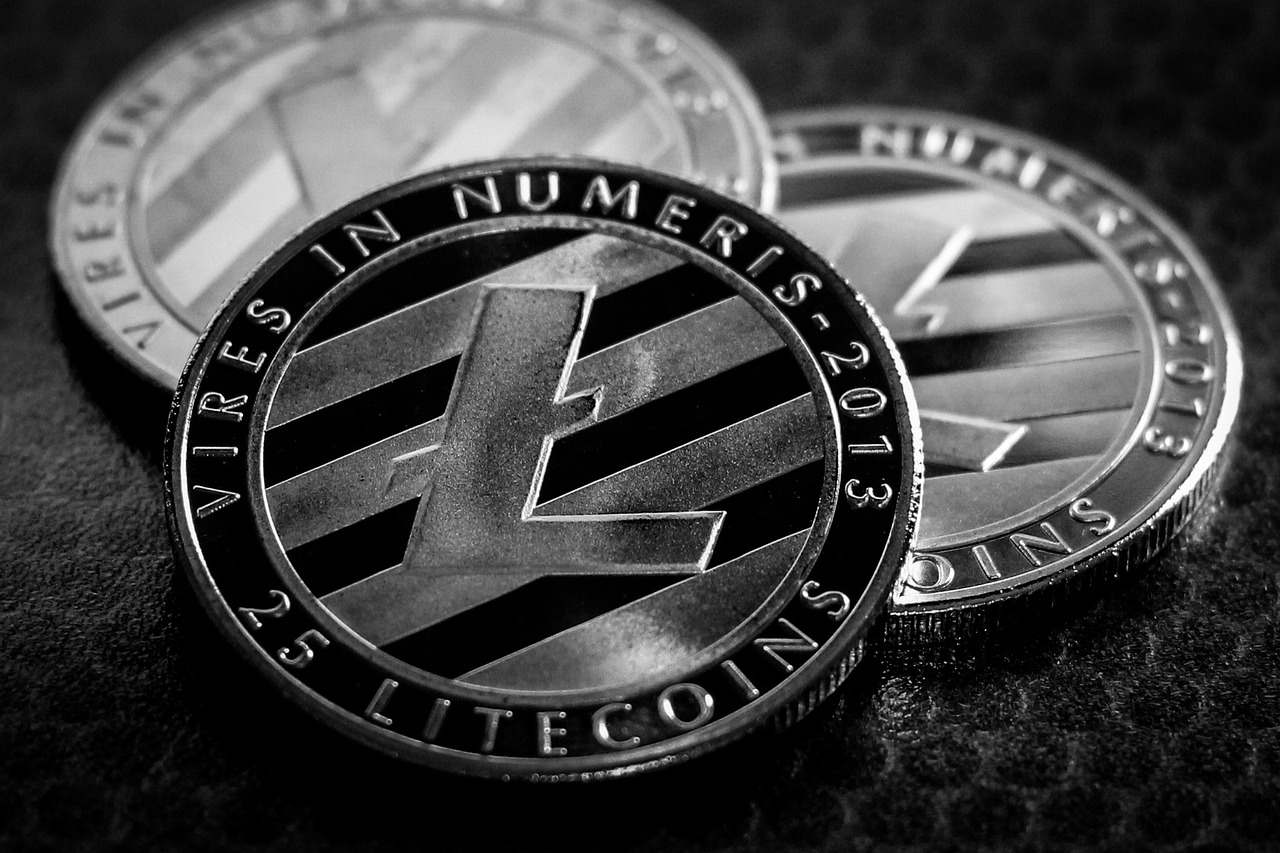
Challenges in Governance Models
The concept of governance in decentralized finance (DeFi) is as thrilling as it is complex. On one hand, governance tokens offer a way for users to participate in the decision-making processes of various protocols, providing them with a sense of ownership and engagement. However, there are significant challenges that can undermine the effectiveness of these governance models. One of the primary issues is voter apathy. Many token holders may not take the time to participate in votes, often due to a lack of understanding or interest in the specific proposals being put forth. This can lead to a situation where only a small percentage of users are making decisions that affect the entire ecosystem.
Another challenge is the concentration of power. In many DeFi projects, a small number of individuals or entities may hold a disproportionate amount of governance tokens. This can skew decision-making processes, as these dominant holders can easily push through proposals that benefit their interests, rather than those of the broader community. This scenario raises important questions about fairness and equality within the governance structure. If a few voices drown out the majority, how can we ensure that the principles of decentralization are truly upheld?
Moreover, the technical complexity of governance proposals can also act as a barrier to participation. Many users may feel overwhelmed by the jargon and intricate details involved in the decision-making process. This complexity can lead to disengagement and a sense of disconnect from the platform. To address these challenges, DeFi projects need to focus on education and community engagement. Simplifying the language around proposals and providing clear, accessible information can help demystify the governance process and encourage more users to participate.
In addition, implementing mechanisms such as quadratic voting could help mitigate the concentration of power by allowing users to express the strength of their preferences rather than just a simple yes or no vote. This approach can lead to more nuanced decision-making and ensure that the voices of minority stakeholders are heard. However, the implementation of such systems also comes with its own set of challenges, including the need for robust infrastructure and user education.
Ultimately, the success of governance models in DeFi will depend on the community's ability to adapt and evolve. By addressing issues like voter apathy and power concentration, and by fostering a culture of active participation, DeFi projects can create more inclusive and effective governance structures. As the DeFi landscape continues to grow, these challenges will need to be navigated carefully to ensure that decentralization remains a core principle of the financial systems being built.
- What are governance tokens? Governance tokens are digital assets that allow holders to participate in the decision-making processes of a DeFi protocol.
- Why is voter apathy a concern in DeFi? Voter apathy can lead to a small group of users making decisions for the entire community, undermining the principles of decentralization.
- How can we encourage participation in governance? By simplifying the governance process and providing educational resources, projects can engage more users in the decision-making process.
- What is quadratic voting? Quadratic voting is a voting mechanism that allows users to express the strength of their preferences, potentially leading to more equitable outcomes.
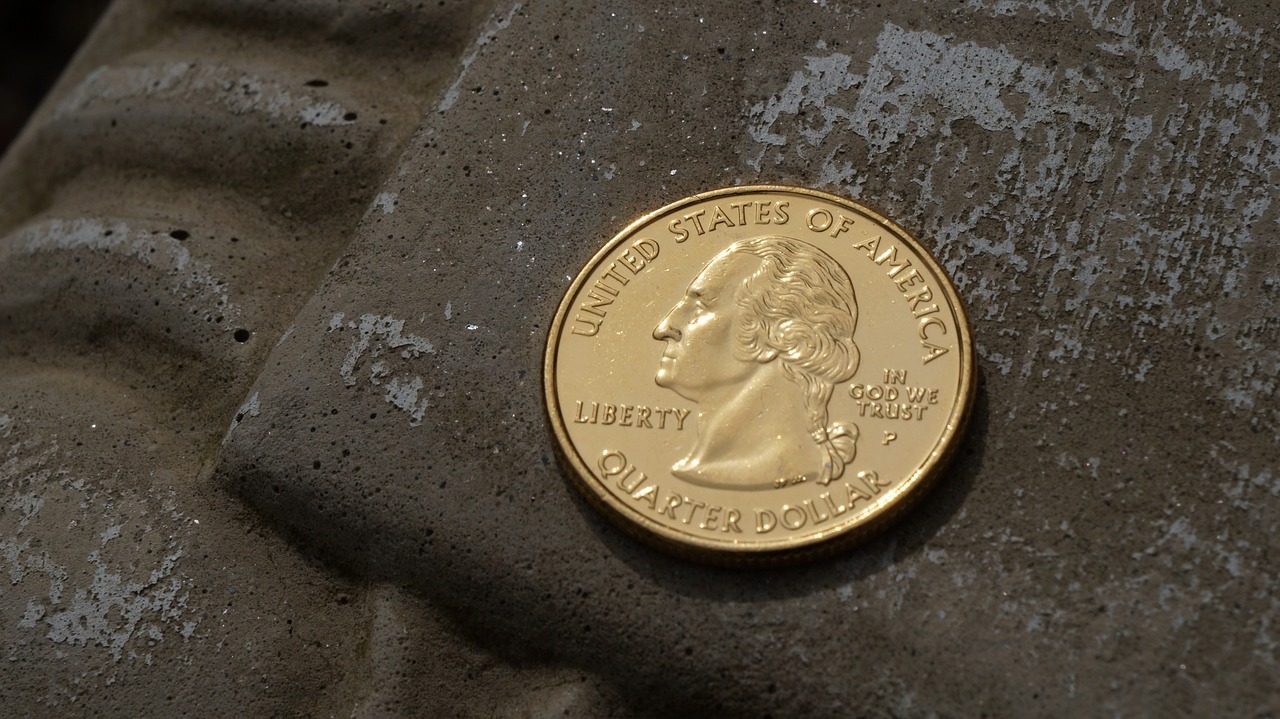
The Future of Decentralized Finance
As we gaze into the horizon of decentralized finance (DeFi), it’s hard not to feel a sense of excitement mixed with curiosity. The potential for innovation is staggering, and we are just scratching the surface of what this financial revolution can achieve. Imagine a world where financial services are not only accessible to the privileged few but are open to anyone with an internet connection. This is the promise of DeFi, and as we move forward, several trends and developments are poised to shape its future.
One of the most significant trends is the increasing integration of traditional finance with decentralized systems. We are already witnessing banks and financial institutions exploring how to leverage blockchain technology to enhance their services. This hybrid model could create a more resilient financial ecosystem that combines the best of both worlds. However, this integration will require overcoming regulatory hurdles and ensuring that the security and transparency of DeFi are maintained.
Furthermore, the advent of layer-2 solutions is set to revolutionize the DeFi landscape. These solutions, which operate on top of existing blockchains, aim to improve scalability and reduce transaction costs. As they gain traction, we can expect a surge in DeFi applications that can handle a higher volume of transactions without compromising on speed or efficiency. The potential for interoperability between different DeFi protocols will also be a game-changer, allowing users to seamlessly move assets across platforms, thereby enhancing liquidity and user experience.
Moreover, the rise of decentralized autonomous organizations (DAOs) is another exciting development. DAOs empower users to participate actively in the governance of DeFi protocols, making decisions collectively rather than relying on a central authority. This shift towards community-driven governance can lead to more innovative solutions tailored to the needs of users. However, it also raises questions about accountability and the effectiveness of decision-making processes, which will need to be addressed as these organizations evolve.
As we look to the future, it’s essential to consider the role of education and awareness in the DeFi space. With the rapid pace of innovation, many potential users remain unaware of how to navigate this complex landscape. Increasing educational initiatives and resources will be crucial in empowering individuals to make informed decisions and engage with DeFi safely. This includes understanding the risks involved, such as market volatility and smart contract vulnerabilities, which cannot be overlooked.
In conclusion, the future of decentralized finance is bright, filled with opportunities and challenges alike. As technology continues to advance and the community grows, we can expect to see a more inclusive financial system that prioritizes transparency, security, and user empowerment. So, buckle up! The journey into the world of DeFi is just beginning, and it promises to be an exhilarating ride.
- What is decentralized finance (DeFi)? DeFi refers to financial services that operate on a decentralized network, typically using blockchain technology, allowing users to transact without intermediaries.
- How does DeFi differ from traditional finance? Unlike traditional finance, DeFi is open to anyone with internet access and does not rely on centralized institutions, making it more accessible and potentially less costly.
- What are smart contracts? Smart contracts are self-executing contracts with the terms of the agreement directly written into code, allowing for trustless transactions.
- What are governance tokens? Governance tokens give holders the right to participate in decision-making processes within DeFi protocols, influencing the direction and policies of the platform.
- Are there risks associated with DeFi? Yes, while DeFi offers many advantages, it also comes with risks such as smart contract vulnerabilities, market volatility, and regulatory uncertainties.
Frequently Asked Questions
- What is decentralized finance (DeFi)?
Decentralized finance, or DeFi, is a financial system built on blockchain technology that allows users to engage in financial transactions without intermediaries like banks. It aims to create an open and permissionless financial ecosystem where anyone with an internet connection can participate.
- How do smart contracts work in DeFi?
Smart contracts are self-executing contracts with the terms of the agreement directly written into code. They automatically execute transactions when predetermined conditions are met, eliminating the need for a third party. This ensures trust and transparency in financial dealings.
- What are the advantages of using smart contracts?
Smart contracts offer several benefits, including increased efficiency by automating processes, reduced costs by cutting out intermediaries, and enhanced security through cryptographic measures. These advantages make DeFi attractive to users looking for streamlined financial solutions.
- What security risks are associated with DeFi?
While DeFi offers enhanced security features, it is not without risks. Smart contracts can have vulnerabilities that may be exploited, leading to financial losses. It's crucial for users to conduct thorough research and rely on audited contracts to minimize these risks.
- What role do governance tokens play in DeFi?
Governance tokens allow users to participate in decision-making processes within DeFi protocols. Holders can vote on proposals, changes, and upgrades, ensuring that the community has a say in the development of the platform. This promotes decentralization and user engagement.
- What incentives do governance token holders receive?
Token holders often enjoy various incentives, such as voting rights, participation in governance decisions, and rewards in the form of additional tokens or fees generated by the protocol. These incentives encourage active participation and foster a sense of community among users.
- What challenges do governance models face in DeFi?
Governance models in DeFi can face challenges like voter apathy, where token holders do not participate in voting, and the concentration of power among a few holders. Addressing these issues is vital for creating a truly decentralized and effective governance system.
- What does the future hold for decentralized finance?
The future of DeFi is promising, with continuous innovations and collaborations expected to enhance its functionality and reach. As the ecosystem matures, we can anticipate the emergence of new use cases and improved governance models that could redefine the financial landscape.






